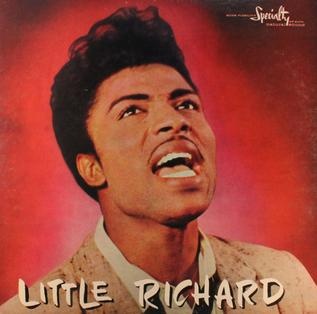Arts Remembrance: An Appreciation of Little Richard
By Adam Ellsworth
Awopbopaloobop alopbamboom.
 That’s rock and roll in one lyric.
That’s rock and roll in one lyric.
What better way to describe that indescribable feeling, when the beat crawls in through your toes, travels up your legs, takes three trips around your groin, and then makes a beeline straight for your heart. Sure, it gets to your head eventually but by then it’s too late. Your brain can’t put the feeling into words, so you start speaking in tongues: Awopbopaloobop alopbamboom.
Little Richard, who died Saturday at the age of 87, could have said nothing else and he would have said it all.
Born Richard Penniman on December 5, 1932 in Macon, GA, Little Richard embodied rock and roll. Yes, Elvis was the King, and Chuck Berry wrote better songs, but Richard was the walking, talking, screaming manifestation of the music’s freedom, its outrageousness, and its life-affirming energy. Better than anyone, he represented the genre’s struggle to walk the line between the abandon of Saturday night and the transcendence of Sunday morning. No surprise then that the man who in 1956 sang, “Well, it’s Saturday night and I just got paid/Fool about my money, don’t try to save/My heart says go go, have a time/’Cause it’s Saturday night and I’m feelin’ fine,” gave up his music career in 1957 (albeit only temporarily) to study theology.
Initially, Richard was a little too much for the mainstream. Whiter-than-vanilla Pat Boone had a bigger hit with his cover of “Tutti Frutti” than African American Richard did with the original. Not that the genuine article went completely unnoticed. As Richard recounted in PBS’s History of Rock and Roll,
And Pat Boone said, “A wop bop a loo bop a lop bam boom.” And I still said, “AWOPBOPALOOBOP ALOPBAMBOOM!” And the white kids wanted to hear, “AWOPBOPALOOBOP ALOPBAMBOOM! WOOOOOOOO!” They wanted to hear me. And so they would still bring me in the house. And they didn’t want their momma to know I was in the house, so they’d put Pat Boone on top of the bed, and they put me in the drawer. But I was still in the same house.
As Vincent L. Stephens argues in his book Rocking the Closet: How Little Richard, Johnnie Ray, Liberace, and Johnny Mathis Queered Pop Music, when Richard did crack the mainstream, it was at least partially because of (and not in spite of) the same flamboyant, “queer” behavior that caused his parents to kick him out of the house only a few years earlier. In these early glory years, Little Richard didn’t acknowledge his sexuality, but he didn’t exactly try to hide it either. Audiences of the ’50s may not have understood exactly what was “different” about Richard, but they knew there was something other about him, and that’s what they were responding to. This was a first for rock and roll.
“I worked like a dog for what I got,” he said in a 1995 interview, “‘cause they wasn’t used to no person at the time bein’ flamboyant like I was. Before Elton John and David Bowie, I was dressin’ like that.”
Richard’s peak was short but his influence was immense. Per Bob Dylan’s high school yearbook, the future voice of a generation’s teenage ambition was “to join ‘Little Richard.’” On early releases by the Rolling Stones, the “s” was chopped off Keith Richards’s surname as an homage. Richard’s music was covered by the Beatles, onstage and on record, and it’s not as if the Fabs were lacking in original material.
But to focus too long on Little Richard’s influence implies that he was nothing more than a building block that others eventually improved upon. There is no doubt that Richard was a cornerstone of rock and roll, and that many a mansion was built atop of the bricks he laid down. But built upon and improved upon are not the same thing. Little Richard was never improved upon. He was one of the best, period. We won’t see his kind again.
Adam Ellsworth is a writer, journalist, and amateur professional rock and roll historian. His writing on rock music has appeared on the websites YNE Magazine, KevChino.com, Online Music Reviews, and Metronome Review. His non-rock writing has appeared in the Worcester Telegram and Gazette, on Wakefield Patch, and elsewhere. Adam has an MS in journalism from Boston University and a BA in literature from American University. He grew up in Western Massachusetts, and currently lives with his wife in a suburb of Boston. You can follow Adam on Twitter @adamlz24.

Thanks for this wonderful appreciation. Sadly Little Richard did not get to personally enjoy the tremendous societal gains that his queer persona helped achieve, as his final interviews reverted to the anti-gay rhetoric of his religious upbringing. It’s yet another example of an artist who inspired so many others without finding true internal peace.